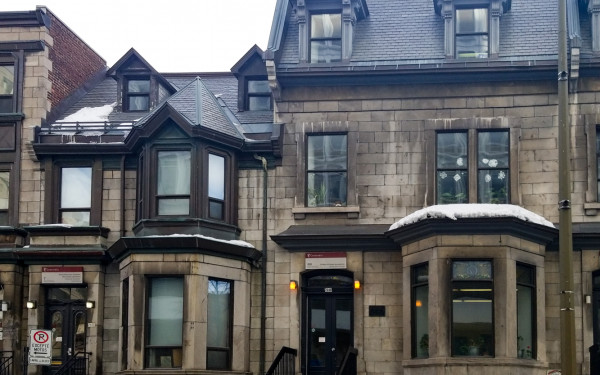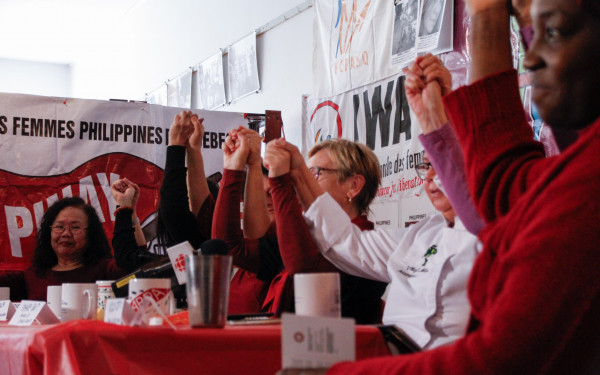Marching for Change
Annual Take Back the Night March Protests Gendered Violence
“I don’t owe you shit,” read one of the many signs that were visible among the group of diverse people gathered at a downtown corner in Montreal.
Mumbled conversation and quiet excitement preceded what was to come—it was the calm before the feminist storm.
On Thursday night, close to 200 people gathered at Norman Bethune Square to participate in the Take Back The Night march organized by the Centre for Gender Advocacy, A Safer Concordia and the Sexual Assault Centre of the McGill Students’ Society. Since the 1970s, the marches have served as international shows of solidarity for women against all forms of gendered violence or harassment.
“I am here because I’m sad that I have to be here in the first place, and I’m going to be here until I feel like I don’t have to,” said McGill student Harshita Iyer.
Hundreds of TBTN marches are held in over 30 countries around the world every year. The first Canadian protest against sexual violence was held in Vancouver in 1978. This year in Montreal, protesters marched from Guy St. all the way to McGill College Ave., halting at McGill University for speeches.
The Centre for Gender Advocacy has organized the annual Take Back The Night march since 2012.
“We march for every person who does not feel safe going home at night, who fears being followed, harassed, abused. We are here to reclaim our right to be in any space, at any time and advocate for safer communities,” reads the Facebook event page description.
Reasons for participation varied—some had no other way of standing up to their aggressors. Others felt the need to educate themselves and those around them about the issue of gendered violence. Some were there to show support, and others wanted to share their experiences.
“I want to show that we can fight back,” said Belvia Dallaire, who was sexually abused and couldn’t denounce her aggressors or express her anger towards them. According to her, sexual assault is a practice that is too often accepted in our society. Now, she is speaking up against it.
1web_700_1050_90.jpg)
“I will never stop because it’s necessary for people to get angry. And it feels good, it’s liberating.” — Belvia Dallaire
“I will never stop because it’s necessary for people to get angry. And it feels good, it’s liberating,” Dallaire said. She was holding high a sign that read, “I don’t want to sit now that I can speak/ I don’t want to shut up now that I can walk,” lines she claims were lifted from a feminist poem.
Prior to the first speeches of the night, the organizers of the event acknowledged the controversial history surrounding Take Back the Night. The first TBTN march, held in San Francisco in 1973, was organized to protest against pornography. The organization was hesitant to allow men to participate, and took a strong stance against transgender individuals.
Organizers assured the crowd that this march would be inclusive of all genders as well as sex workers.
“In the current iteration here, I’m really happy and inspired by the inclusivity,” said Concordia student Enok Ripley. They added that trans inclusion is being talked about more openly during different rallies, which is an important step forward.
Despite some difficulties with the sound system, those giving speeches managed to grab the crowd’s attention, and excitement began to grow. Aimee Louw, an activist from Accessibility Montreal thanked everyone for being present to “stand up to misogyny,” and invited each participant to “look at the structural things that both enrich harassment and help to stop it.”
Following Louw’s speech was Jennifer Drummond, coordinator for the Sexual Assault Resource Centre at Concordia. Drummond mentioned the importance of making the campus safer and educating the community on how to stop situations that could lead to sexual violence.
First Nations activist Marie-Josée Tremblay recited a traditional prayer over the crowd. Silence fell as she sang.
“Things are slowly changing. I think people are becoming more aware of the Native women’s perspective,” she said in an interview. “I think the missing and murdered indigenous women are a big issue.”
Sexual harassment of Native women was a prevalent topic at the march, following recent allegations of long-standing sexual assault and abuse of indigenous women by police in Val-d’Or. Many, including Tremblay, expressed hope for the future with Justin Trudeau’s new Liberal government.
A woman named Chantel Henderson from the Missing Justice campaign offered a testimony of her experience with rape and abuse, saying the new government “means hope for change and support in the Aboriginal community.” She was talking specifically about the new Minister of
Aboriginal Affairs, Carolyn Bennett and new Minister of Justice, Jody Wilson-Raybould, the first indigenous woman to hold the position.
After the speeches, one bystander began vocally opposing the demonstration.
“GO HOME!” a young man’s voice resonated from the apartment building on Ste. Catherine St. He was waving and laughing.
“Fuck you, asshole!” and similar statements rang through the crowd. Middle fingers flew into the air as the group was faced with opposition. The crowd chanted louder: “Whose streets? Our streets!”
“It’s still an issue that’s not regarded with full seriousness,” said McGill student Reagan Shoenwolz. “The fact that the issue [is] still surprising or funny to people reminds me that there’s a reason I am here … and that I have to continue to be here.”
Correction: Due to errors during the editing process, a previous version of this article identified Enok Ripley with the “he” pronoun. Ripley identifies as “they.” In addition, the previous version incorrectly referred to the Sexual Assault Resource Centre as the Sexual Assault Research Centre. The Link regrets the errors.

1web_900_600_90.jpg)
_600_832_s.png)



_600_375_90_s_c1.jpg)
_600_375_90_s_c1.jpg)